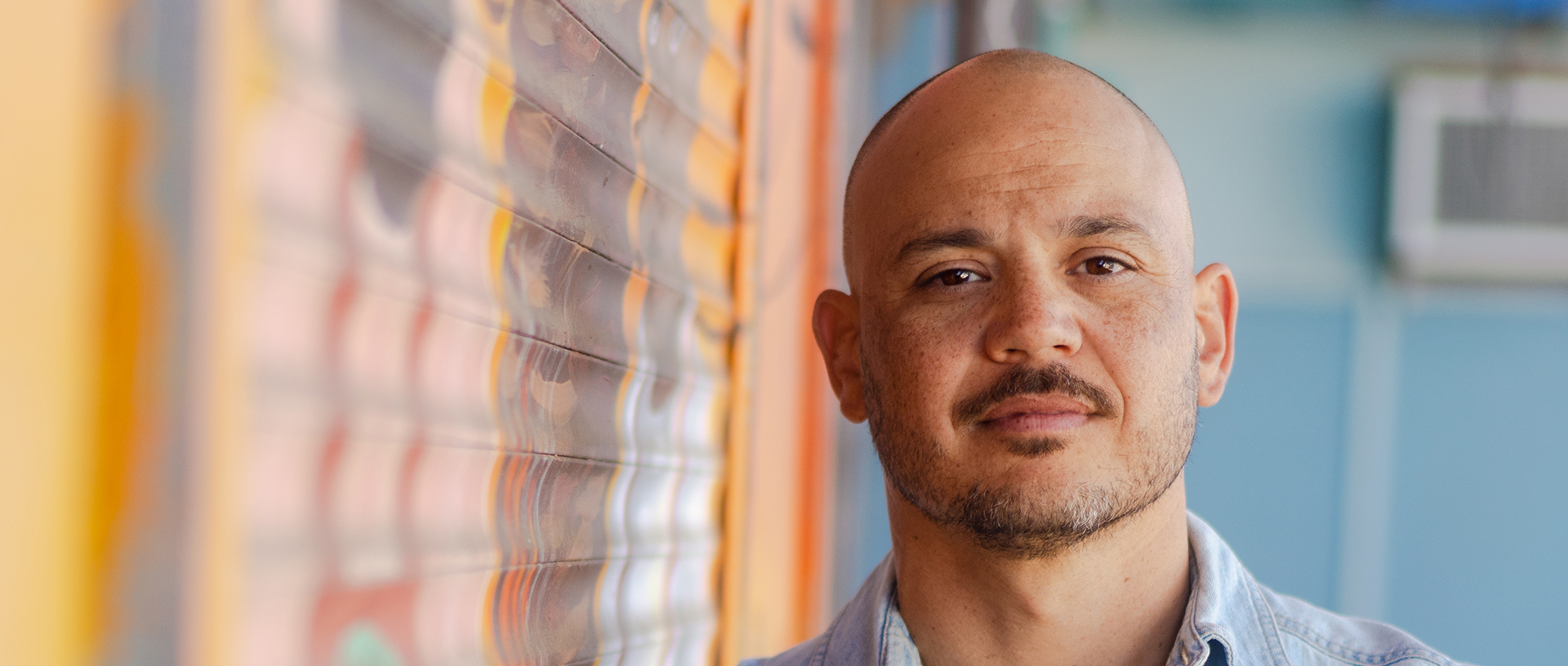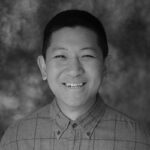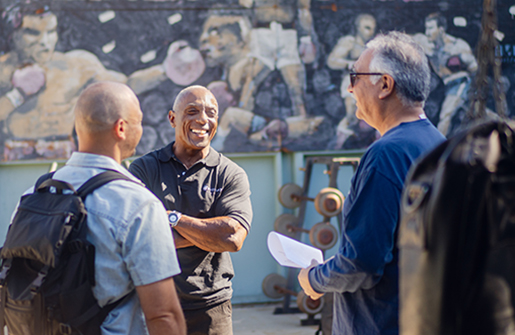
Jarret Keith (MAT ’21) remembers his first day of class at Fuller vividly: Dr. Roberta King began class by announcing, “I have a surprise for you today. I bet you have never met anyone who was sentenced to life in prison before.”
Jarret, recently released from prison, felt his heart sink. How could his professor have possibly known about his past? Who would have told her? To his surprise, Dr. King motioned to a woman sitting up front and introduced her as Linda Barkman, a fellow Fuller student who had been incarcerated for 30 years, and who would be the class’s TA. At that moment, Jarret knew God had him in the right place.
When talking with Jarret—husband and father of two, cofounder of Testimony Ministries, and outreach pastor at Renew Church LA—it’s difficult to imagine him behind bars. He makes one feel at home with his quick wit, gentle spirit, and warm-hearted, pastoral presence. But Jarret will be the first to tell you that he was not always like this.
Growing up in a rough neighborhood full of drugs, gangs, and poverty was challenging enough, but Jarret’s biggest struggle was with himself. His tan skin reflects his half-Mexican and one-eighth Native American heritage, but the implicit message in his childhood was that it was more valuable to be white. “My dad presents as fully white: he is tall, has blue eyes and very fair skin. So I compared myself to my dad and realized I’d never be able to live up to that ideal version of a human,” shares Jarret. “I had a lot of social confusion, a lot of social tension, and just a lot of self-confusion. I grew up seeing these limitations of who and what I could become, and I felt disempowered and hopeless about life, but I didn’t know how to process all of this as a kid.” His confusion and shame grew into anger, and the internal turmoil led him to the pathways of crime that were prevalent in his community. When he was 19 years old, he was incarcerated and sentenced to life in prison.
“I became very depressed,” Jarret recalls. “The message was, ‘You’re no good. You’re worthless. You don’t have value in society. Society is better off without you. You’re irredeemable, and everyone—including yourself—is better off if you’re incarcerated.’ From the life that I had lived up until that point, it made sense.”
Surprisingly, hope arrived in the form of “two old white dudes”—as Jarret puts it. The picture Jarret paints of their weekly chapel service is almost comical: “They came every week and did the same thing every time. They shared their testimony and sang songs out of an old hardback hymnal. It was me and maybe five or six other guys who couldn’t relate to anything they were saying or the songs we were singing with mediocre, terrible voices. It was a crazy dynamic.”

Yolanda “Yo” Miller leads spiritual formation groups for Fuller, the De Pree Center, and Soul Care in Boulder, Colorado. Learn more about her and her work as a soul coach at yo-miller.com.

Eric Tai is an artist, photographer, and illustrator based in Southern California.
Jarret Keith (MAT ’21) remembers his first day of class at Fuller vividly: Dr. Roberta King began class by announcing, “I have a surprise for you today. I bet you have never met anyone who was sentenced to life in prison before.”
Jarret, recently released from prison, felt his heart sink. How could his professor have possibly known about his past? Who would have told her? To his surprise, Dr. King motioned to a woman sitting up front and introduced her as Linda Barkman, a fellow Fuller student who had been incarcerated for 30 years, and who would be the class’s TA. At that moment, Jarret knew God had him in the right place.
When talking with Jarret—husband and father of two, cofounder of Testimony Ministries, and outreach pastor at Renew Church LA—it’s difficult to imagine him behind bars. He makes one feel at home with his quick wit, gentle spirit, and warm-hearted, pastoral presence. But Jarret will be the first to tell you that he was not always like this.
Growing up in a rough neighborhood full of drugs, gangs, and poverty was challenging enough, but Jarret’s biggest struggle was with himself. His tan skin reflects his half-Mexican and one-eighth Native American heritage, but the implicit message in his childhood was that it was more valuable to be white. “My dad presents as fully white: he is tall, has blue eyes and very fair skin. So I compared myself to my dad and realized I’d never be able to live up to that ideal version of a human,” shares Jarret. “I had a lot of social confusion, a lot of social tension, and just a lot of self-confusion. I grew up seeing these limitations of who and what I could become, and I felt disempowered and hopeless about life, but I didn’t know how to process all of this as a kid.” His confusion and shame grew into anger, and the internal turmoil led him to the pathways of crime that were prevalent in his community. When he was 19 years old, he was incarcerated and sentenced to life in prison.
“I became very depressed,” Jarret recalls. “The message was, ‘You’re no good. You’re worthless. You don’t have value in society. Society is better off without you. You’re irredeemable, and everyone—including yourself—is better off if you’re incarcerated.’ From the life that I had lived up until that point, it made sense.”
Surprisingly, hope arrived in the form of “two old white dudes”—as Jarret puts it. The picture Jarret paints of their weekly chapel service is almost comical: “They came every week and did the same thing every time. They shared their testimony and sang songs out of an old hardback hymnal. It was me and maybe five or six other guys who couldn’t relate to anything they were saying or the songs we were singing with mediocre, terrible voices. It was a crazy dynamic.”
Yolanda “Yo” Miller leads spiritual formation groups for Fuller, the De Pree Center, and Soul Care in Boulder, Colorado. Learn more about her and her work as a soul coach at yo-miller.com.
Eric Tai is an artist, photographer, and illustrator based in Southern California.


Yet the Holy Spirit worked through these weekly encounters, to the point where Jarret found himself humming the tunes throughout the week and eventually, one night, falling to his knees, crying out to God for a fresh start, and surrendering his life to Jesus. He reflects on his journey to an authentic relationship with God: “When I look back, it wasn’t even the singing or anything they said. It was this space they created just by being present—it created a sense of freedom that displayed the gospel. It felt like, when I was in that room, I didn’t have to worry about a fight breaking out. I didn’t have to worry about looking tough. I could take a breath, relax, be me. And then, when the hour was over, I’d put the shell back on and head back. They created a space where I could begin to taste what it would be like to be free. That’s what God used to show me he was the key to hope and redemption and freedom. For the first time since I was a kid, I had hope.”
Slowly, Jarret’s transformation began to unfold. He got “duped” into playing music for the worship services, since the two men leading them were the only people who would teach him to play the guitar. He started reading the Bible and praying, learning how to mend relationships, and attending school. He went on to become the first person in his family to graduate from college, completing two associate’s degrees in prison. He also became certified as a substance use disorder counselor, developing and leading workshops which continue to be used inside California state prisons today.
After 15 years, policy reforms addressing excessive prosecution and sentencing created an opportunity for Jarret to return to the community based on his exemplary testimony and demonstrated rehabilitation efforts. When he was released, he had plans to move up the ranks in a career as a counselor, but he began to feel a divine restlessness.
One day, he came across an old and untouched application to Fuller that he’d had through a special three-year program he’d completed in prison called the Urban Ministry Institute. He struck a deal with God and said, “OK, I’ll apply. If you’re calling me to something else besides counseling and open the door, I’ll go through it. But if you’re not, leave me alone!”
Sure enough, he was accepted, and after his startling introduction to Fuller by Dr. King, there was no doubt in his mind that God was orchestrating something in his life.
As Jarret progressed in his studies at Fuller and continued to be deeply involved in justice reform work, he noticed a painful dichotomy: While he appreciated the constant dialogue about theology and its implications in his Fuller classes, he did not see those conversations leading to any practical actions impacting the communities in which he worked. Conversely, while he found his work in criminal justice reform and social justice spaces profoundly satisfying, those spaces were often dismissive of—even hostile to—anything faith-related, even though Jarret considered his Christian faith central to his work. Churches balked at his attempts to help returning citizens integrate into their congregations, while the coalition and prisons rejected his attempts to integrate even ecumenical faith into his programs, even though he demonstrated that 80 percent of the prisoners in his caseload indicated they had a Christian faith that helped them survive on the inside.
“I was finding churches knew very little to nothing about incarcerated people who are coming home,” laments Jarret. “They didn’t know how to serve them or what to do with them. But so many of them had been serving, leading, even pastoring, in the church in prison, which I refer to as ‘the incarcerated church.’” When these believers finally gain their freedom, they lose their faith communities and the opportunities to be and serve the body of Christ.
Jarret says, “On the day you leave prison, that community gets stripped away, and you’re out on your own. Your identity is gone, your community is gone, your purpose is gone. Nobody knows how to relate to you and there’s very little opportunity to serve in the churches, even if you’re really serious about your faith and have had faith play a major role in your life for years. So returning citizens really long for that community but are unable to recreate it outside of prison walls.”


Jarret attempted to bridge this gap, but he kept running into closed doors and closed minds. At Fuller, he started a student group called Transform Criminal Justice to educate students and the church about how they could not only think about but also act on behalf of the incarcerated. Just as they were gaining traction and preparing to host their largest event ever, COVID shut everything down—but it also finally blew the doors wide open.
Jarret remembers, “People who were coming home from prison during the pandemic started calling me, saying, ‘We don’t know what to do. All the churches are closed. How do I find a church?’ They knew that, without a church, they would be tempted to return to their old lives. But when people come home, they don’t know how to do things online because many were incarcerated before social media, before Zoom, and all of that. So I began leading weekly calls to teach them how to use Zoom.”
The Zoom meetings soon evolved into simple, house-church-like gatherings where those in reentry could read and reflect on Scripture, share their testimonies and their struggles, and pray for each other. These led to annual reunions of about 200 men and women coming home from various prisons throughout California. Unwittingly, Jarret had birthed Testimony Ministries, which provides reentry discipleship to those who have been incarcerated in California and partners with local churches to mobilize faith, create restorative opportunities, and advocate for gospel-centered justice.
God began to open doors to partnerships, leading Jarret to establish reentry homes for returning citizens who needed a place to live, which eventually led to residents forming microchurches in their underresourced communities. Then he asked, “What if we did internships?” He found churches willing to run a pilot attempt, raised funds to stipend the positions, and developed a curriculum to help the church partners and returning citizens tailor the positions to their gifts. The 90-day internships were so successful that one participant ended up being hired by the church and another started his own nonprofit. Jarret says, “One brother had been sentenced to 45 years, and the other had a double life sentence. They were not supposed to ever come home, and now, they’re bringing life to these churches.” Unsurprisingly, more churches have signed on as partners.
Jarret is also now partnering with Fuller, where he’s returned for a doctorate, by creating a FULLER Equip course called “Empowered Inside” that can provide transferable credits toward a degree program for incarcerated students. He is thrilled by the inaugural class of 25 participants at Lancaster Prison, saying, “This is so important to me personally because I hit a dead end inside; I could have had a master’s degree years earlier if I had access to it in prison. I never thought this ministry would be able to tackle something this big, but God opened the door for us. We’re hoping to expand it into other prisons and to keep creating greater access to education for people pre-release, before they come home.”
Jarret marvels at all that has transpired since his coming home, musing, “This was never the plan. It’s really crazy. And I always tell people none of what we’re doing is because of my good plan; it’s always through the good people and the good relationships God brings us.”
On an unexpected path to seminary and ministry, Raul Sandoval finds a new sense of belonging and vocational purpose in Los Angeles, the city he calls home.